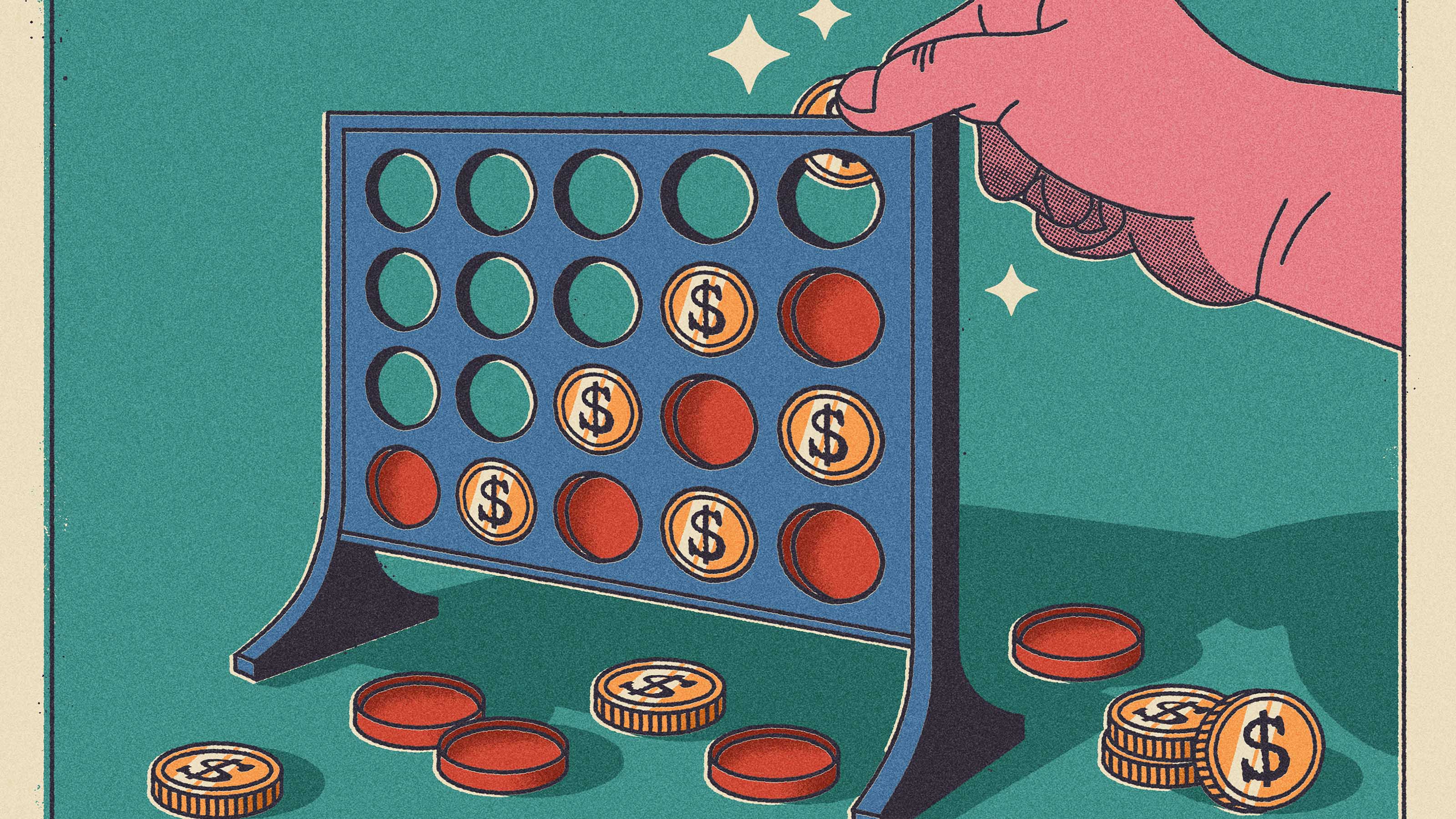Patience Pays Off for Investors
I am not selling my stocks. I expect our leaders to compromise for the good of the country.

Profit and prosper with the best of Kiplinger's advice on investing, taxes, retirement, personal finance and much more. Delivered daily. Enter your email in the box and click Sign Me Up.
You are now subscribed
Your newsletter sign-up was successful
Want to add more newsletters?

Delivered daily
Kiplinger Today
Profit and prosper with the best of Kiplinger's advice on investing, taxes, retirement, personal finance and much more delivered daily. Smart money moves start here.

Sent five days a week
Kiplinger A Step Ahead
Get practical help to make better financial decisions in your everyday life, from spending to savings on top deals.

Delivered daily
Kiplinger Closing Bell
Get today's biggest financial and investing headlines delivered to your inbox every day the U.S. stock market is open.

Sent twice a week
Kiplinger Adviser Intel
Financial pros across the country share best practices and fresh tactics to preserve and grow your wealth.

Delivered weekly
Kiplinger Tax Tips
Trim your federal and state tax bills with practical tax-planning and tax-cutting strategies.

Sent twice a week
Kiplinger Retirement Tips
Your twice-a-week guide to planning and enjoying a financially secure and richly rewarding retirement

Sent bimonthly.
Kiplinger Adviser Angle
Insights for advisers, wealth managers and other financial professionals.

Sent twice a week
Kiplinger Investing Weekly
Your twice-a-week roundup of promising stocks, funds, companies and industries you should consider, ones you should avoid, and why.

Sent weekly for six weeks
Kiplinger Invest for Retirement
Your step-by-step six-part series on how to invest for retirement, from devising a successful strategy to exactly which investments to choose.
Welcome to the 1970s. The decade that gave us disco and Archie Bunker was also a time of economic stagnation, widespread dissatisfaction with government and corporate America, and a stock market that just couldn't seem to get unstuck. Oh, sure, it's 40 years later. But just like bell-bottoms and bare midriffs, the investment malaise of the '70s appears to have made a comeback. Then, as now, the stock market staged multiple advances. But the moment investors got comfortable with the notion of earning a reasonable return, some sort of crisis upended the rally. So the same question that was asked so frequently then is again on the lips of stock market investors: Is it time to bail?
It would be great to provide a simple yes-or-no answer. And yet it's impossible without asking another question first: Why do you own stocks?
The long view. If you're investing for a short-term goal -- anything that requires cash within the next five years -- putting your money in stocks is inordinately risky. That's because stocks, by their nature, are volatile. The faintest whiff of economic smoke and market pundits yell "Fire!" and head for the exits. If your dreams rest on short-term stock market performance, they can quickly go up in flames. But if you're investing for a long-term goal, you may want to fall back on ancient wisdom embodied in the proverb "This too shall pass."
From just $107.88 $24.99 for Kiplinger Personal Finance
Become a smarter, better informed investor. Subscribe from just $107.88 $24.99, plus get up to 4 Special Issues

Sign up for Kiplinger’s Free Newsletters
Profit and prosper with the best of expert advice on investing, taxes, retirement, personal finance and more - straight to your e-mail.
Profit and prosper with the best of expert advice - straight to your e-mail.
I say this, of course, as much for me as for you. Like many others, I worry about the "fiscal cliff," not to mention the burgeoning federal budget deficit, which could have disastrous consequences down the road.
During the stock market's post–Election Day swoon, I, like many other investors, thought about selling my stocks. In my mind flashed the dangers of the fiscal cliff, which refers to the drastic spending cuts and tax hikes that will be triggered if our leaders can't reach a compromise to cut the deficit. Permitting the government to fall off the cliff would likely precipitate a recession. But the partisan divide is so wide that it is conceivable that legislators and the White House really could allow the nation to fall into an economic abyss.
Yet the fiscal cliff may be the least of today's worries, because it can be averted. The mushrooming federal deficit, on the other hand, presents real and substantial concerns that are not easily solved. You can cut the deficit through economic growth, which boosts tax revenue, or by reducing spending or raising taxes -- or by some combination of all three. Growing our way out of the deficit is looking unlikely at the moment, and the other two options have important consequences. Reducing government spending -- even just reducing the growth of spending -- means less money will be poured into the economy. Raising taxes takes money out of people's pockets and often boosts tax "avoidance" -- not necessarily cheating, but putting more money into, say, tax-free municipal bonds rather than stocks. Thus, tax hikes often prove less effective at raising revenue than their proponents would suggest.
So, then, why am I not selling my stocks? Partly because I expect our leaders to stop bickering and reach a compromise for the good of the country (they may have already done so by the time you read this).
But thanks to Morningstar's Ibbotson unit, we also have 86 years of stock market history to turn to for solace. What does it tell us? The worst 15-year periods for stocks ended in the early 1940s and the early 1980s. Those miserable stretches encompassed the Great Depression and the great malaise of the '70s. But the bleak times were followed by the rewarding 1950s and early '60s, and the super-lucrative '80s and '90s.
In other words, I believe I will be rewarded for being patient. If you have decades on your side, you can wait out the market's frequent spills. Just don't expect a smooth ride.
Kathy Kristof is a contributing editor to Kiplinger's Personal Finance and author of the book Investing 101. You can see her portfolio at kiplinger.com/links/practicalportfolio.
Profit and prosper with the best of Kiplinger's advice on investing, taxes, retirement, personal finance and much more. Delivered daily. Enter your email in the box and click Sign Me Up.

-
 Look Out for These Gold Bar Scams as Prices Surge
Look Out for These Gold Bar Scams as Prices SurgeFraudsters impersonating government agents are convincing victims to convert savings into gold — and handing it over in courier scams costing Americans millions.
-
 How to Turn Your 401(k) Into A Real Estate Empire
How to Turn Your 401(k) Into A Real Estate EmpireTapping your 401(k) to purchase investment properties is risky, but it could deliver valuable rental income in your golden years.
-
 My First $1 Million: Retired Nuclear Plant Supervisor, 68
My First $1 Million: Retired Nuclear Plant Supervisor, 68Ever wonder how someone who's made a million dollars or more did it? Kiplinger's My First $1 Million series uncovers the answers.
-
 The Most Tax-Friendly States for Investing in 2025 (Hint: There Are Two)
The Most Tax-Friendly States for Investing in 2025 (Hint: There Are Two)State Taxes Living in one of these places could lower your 2025 investment taxes — especially if you invest in real estate.
-
 The Final Countdown for Retirees with Investment Income
The Final Countdown for Retirees with Investment IncomeRetirement Tax Don’t assume Social Security withholding is enough. Some retirement income may require a quarterly estimated tax payment by the September 15 deadline.
-
 How to Beef Up Your Portfolio Against Inflation
How to Beef Up Your Portfolio Against Inflationinvesting These sectors are better positioned to benefit from rising prices.
-
 Taxable or Tax-Deferred Account: How to Pick
Taxable or Tax-Deferred Account: How to PickInvesting for Income Use our guide to decide which assets belong in a taxable account and which go into a tax-advantaged account.
-
 Smart Investing in a Bear Market
Smart Investing in a Bear Marketinvesting Here's how to make the most of today’s dicey market.
-
 How to Open a Stock Market Account
How to Open a Stock Market Accountinvesting Investing can be fun, but you need a brokerage account to do it. Fortunately, it’s easy to get started.
-
 The Right Dividend Stock Fund for You
The Right Dividend Stock Fund for YouBecoming an Investor Dividend stock strategies come in many different flavors. Here's what to look for.
-
 Alternative Investments for the Rest of Us
Alternative Investments for the Rest of UsFinancial Planning These portfolio diversifiers aren't just for the wealthy.